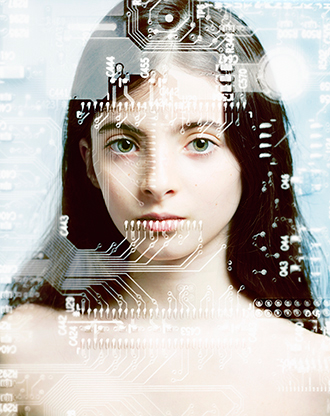| Home | > > > > Texts |
Contacts |
|
Binary Kids Catalogue du Mois de la Photo à Paris, November 2008.
From the end of the 80s on, Thierry Cohen has been a pioneer in the use of digital techniques. Today, his subject-matter – child portraiture – is firmly rooted in a classical tradition. But the work has acquired a fresh dimension in that it makes explicit the core of its own technical processes: over the purity of children's faces, depicted face to camera, Cohen has superimposed images of the circuitboards and electronic components without which his images would not exist. Initially arbitrary, these superimpressions are reworked by the photographer in such a way as to emphasize a sensation of transparency. The abstract reality of numbers, morphing into incarnation, generates a form of representation in which the individual – and individuality itself – seem almost to vanish. But then a process of discreet correction – geometrical and optical – comes to counteract this neutrality. Thus a circuitboard is elongated to emphasize a contour. A pattern of soldering emphasizes the sense of symmetry. The shadow of a microchip hazes hair. The silhouette of a printed circuit loosens focus. An evident and sensitive attention to creative detail counterbalances the impersonal, paradoxically resurrecting the prospect of individuality. Such is the elementary, yet subtle, process by which these photographs acquire fertile meaning, both figurative and metaphorical. Needless to say, portraits of adults might have provided the same wealth of fundamental speculation. But not the implication – barely just indicated but definitely present – that there are now questions to be asked about the future of human beings exposed to information technology and networking. For as these kids – more mature, in this respect, than we are – come face to face with computers and with the binary responses of digital processes, they need to know how their thought-processes, their critical intelligence, their freedom of thought and their capacity for imagination, will survive and adapt in the world stamped over their faces here. By confronting us with such issues, these photographs offer a new poetic of the human face and thus acquire a paradoxical and lively philosophical dimension. Nadine Pouillon, conservateur honoraire Centre Pompidou
|
Français | |||
 |
|||||
|
|||||
| |||||